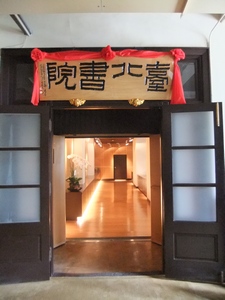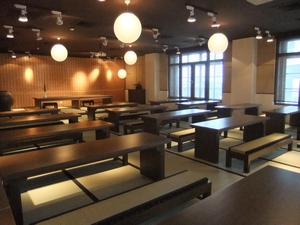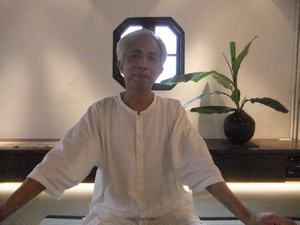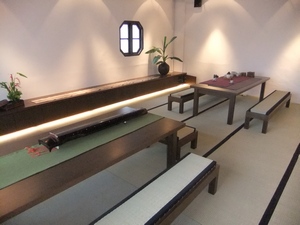Taipei Lecture Hall welcomes people seeking refuge in modern world
By Psyche Cho “In today’s society, there are many people talking about creativity, but fewer paying attention to culture,” said Lin Gu-fang, the first principal of the academy, at the opening ceremony of Taipei Lecture Hall September 15 in Taipei’s Zhongshan Hall. “There are even fewer talking about classic culture,” continued Lin. Holding to the belief that ‘classic’ values are a fundamental part of a nation, Lin intends to make the space into a place where students can find a settled corner of their lives. Climbing up the winding stairs up to Taipei Lecture Hall, located on the third floor of Taipei Zhongshan Hall, a tranquil atmosphere fills the air as the observer takes in tea tables spread along the path. This space was once used by the Taipei Chinese Orchestra for rehearsals and as office space. It is now reopened to the general public after a re-engineering project was completed recently. Walking into the space, you see a traditional Chinese style seats layout set up on the right hand side. Students sit cross-legged on straw mats, facing their mentor, like their ancestors did in ancient China. This distinctive style of education originated in the Tang Dynasty and flourished during the Song Dynasty. Well-known academies like the White Deer Grotto Academy are of significant importance in the history of China. In Taiwan, there were once more than sixty academies of all sizes during the latter Qing Dynasty. “Academies are different from courses designed for practical purposes,” said Lin. “After all here we seek not advancement in knowledge, but principally the enlightenment of a living philosophy.” The courses are designed in the light of the fact that the ability to understand varies from individual to individual. Thus students can choose courses based on their approach to learning, said Lin. Mentors, in Lin’s opinion, are the centerpiece of academy education. They not only must be equipped with profound knowledge—like professors at a university—according to Lin, but must also be more like a fulfiller of their art. “Knowledge remains abstract only until one practices it in daily life,” said Lin, who is known as a Zen practitioner, musician, and cultural commentator. He currently serves as the Chair of the Graduate Institute of Art Studies, Fo Guang University. Given such considerations, lecturers are carefully selected to meet Lin’s standards. In the first term, Lin teaches the art of Zen; last year’s Taipei Cultural Award receiver Hsin Yi-yun teaches lessons in Laozi; Ni Tsai-chin teaches Chinese literati painting; and artist Hsi Sung guides students into the world of Zen in walking and sitting meditation. To fulfill the principle of practice in daily life, the courses are supplemented with lectures related to the arts of tea and flower arrangement. Lin believes that only when one personally realizes the teachings through practice can one really acquire the essence of academy-style education. The two courses will be available in three levels, primary, advanced, and thematic study. Other lectures on tea and gu-qin are also in planning, and related information will be released on the website of Zhongshan Hall. Moreover, tea feasts prepared by experienced tea ceremony practitioners will be available in October. Large-scale programs titled?Chinese?Tea?and Music in Dialogue prepared by Lin will also go on stage in October and December respectively. Lin particularly pointed out that the tea ceremony is the best way to see the real Taiwan culture. “Having a cup of tea has become a living art in the Chinese-speaking world,” he said, going on to say that “it is an art of modest character.” Given a tea setting design, and sitting on straw mat, tea ceremony practitioners can immediately create a universe of solitude and immerse themselves in and feel a real sense of settlement. Through the art, the fragrance, and the action of serving tea to guests, the practitioners can attain a philosophical reflection, artistic enlightenment and even bonds with people. Lin further explained that as the Taipei Lecture Hall is located in a Grade 2 Historic Site in downtown Taipei, it certainly will become a destination for those who wish to understand Taipei or Taiwan. The tea ceremony, he emphasizes, is one of the best ways to learn the real Taiwan, or the hidden nature of Taiwan as he calls it. But what is the ‘dominant’ character here? Political commentators on TV, he said, create a very active and bustling scene in Taiwan. “People endlessly boast about themselves,” observed Lin. “But that’s not the essence of Taiwan.” Even more people don’t care about political manipulation and instead focus on their personal lives. This, according to Lin, corresponds to the spirit of tea ceremony and is also a balancing force to maintain the stability of Taiwan society. “I expect Taipei Lecture Hall to function as a window for outsiders, a cultural indicator like a lighthouse,” said Lin. As a result, “the number of students signing up for courses doesn’t matter,” he opined, “what matters is that lecturers and courses must be able to convey the constant value of life.” As for whether there will be new courses taught by other mentors, or whether the courses will continue to be based on similar themes, are an open question or out of the question for Lin. For the veteran cultural worker, his philosophy holds to the original idea of founding the academy, and remaining open to its development. Taipei Lecture Hall is open 1 p.m. to 5 p.m. until September 30 and will extend to 9 p.m. in the beginning of October. More information is available on https://tplecturehall.wordpress.com(Chinese).
STAFF REPORTER Even though modernity seems to be equated with convenience for most people, the tremendous amounts of information and ever-changing values that are emerging have made many uneasy in both in their lives and their minds. The government-run Taipei Lecture Hall (台北書院) has been founded as a response to calls to revive the education of the inner spirits in these modern times.
Even though modernity seems to be equated with convenience for most people, the tremendous amounts of information and ever-changing values that are emerging have made many uneasy in both in their lives and their minds. The government-run Taipei Lecture Hall (台北書院) has been founded as a response to calls to revive the education of the inner spirits in these modern times.  Over the main classroom of the academy hangs a board that reads ‘Taipei Lecture Hall’ which is the handwriting of contemporary calligraphy master Chang Kuang-pin. The 96-year-old artist received the National Award of the Republic of China and the National Culture and Arts?Foundation in 2010.
Over the main classroom of the academy hangs a board that reads ‘Taipei Lecture Hall’ which is the handwriting of contemporary calligraphy master Chang Kuang-pin. The 96-year-old artist received the National Award of the Republic of China and the National Culture and Arts?Foundation in 2010. Lin has plotted out courses that cover four major aspects including moral teachings, knowledge, art and life. “Practicing moral teachings is the beginning point while art serves as the focus of life,” explained Lin.
Lin has plotted out courses that cover four major aspects including moral teachings, knowledge, art and life. “Practicing moral teachings is the beginning point while art serves as the focus of life,” explained Lin.  “Therefore the tea ceremony actually creates a wholesome universe from the standpoint of both material and philosophical aspects,” concluded Lin.
“Therefore the tea ceremony actually creates a wholesome universe from the standpoint of both material and philosophical aspects,” concluded Lin.

![Taiwan.gov.tw [ open a new window]](/images/egov.png)
